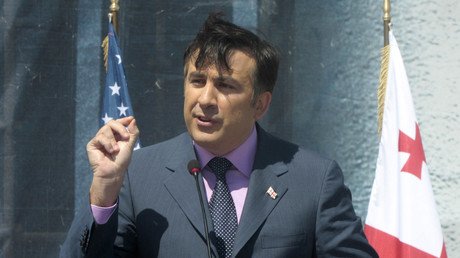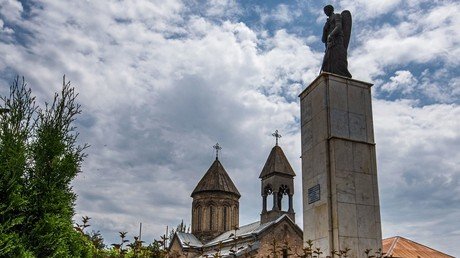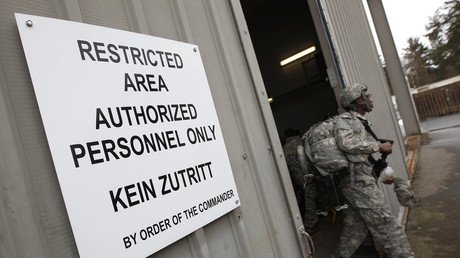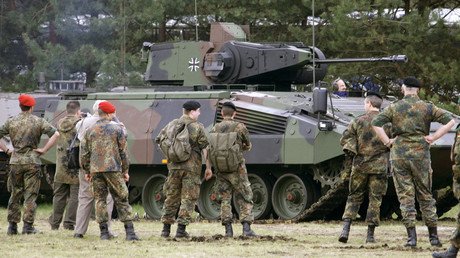'Don't leave us. We'll die': Nurse recalls rescuing 19 special needs patients from Georgian shelling
A nurse from South Ossetia, who rescued 19 people from a burning psychiatric ward in Tskhinval during the Georgian raid and spent days in a cellar with terrified mental patients, has recalled the tragic events of August 2008.
Irina Bibilova was on a night shift on August 8 when the Georgian forces launched a sudden, large-scale attack on the breakaway Republic of South Ossetia. Its capital Tskhinval immediately came under indiscriminate shelling, with a local psychiatric ward becoming one of the targets.
As the first explosions were heard, Irina and other medics decided to gather the patients on the first floor of the hospital. But they quickly realized that it wasn't safe there either and began evacuating the facility.
"Under the garage building [not far from the hospital] there was a trench to repair the cars. And they let us in and we stayed in that hole for 24 hours," Irina told RT's Ruptly video agency.
At some point, the nurses realized that one of their female patients had been left behind and they made a heroic decision to abandon their shelter to retrieve her. When they found the woman, the hospital was already burning after being hit by artillery and it was no easy task to persuade the mentally ill person to go with them.
Irina recalled that she and other nurses even tried to extinguish the flames, saying: "Despite the shelling, we managed to get three buckets of water there, but, of course, we couldn't save our hospital."
"But, thank God, we managed to save the patients," Irina recalled, barely able to hold back her tears.
She gave her interview at the ruins of the hospital, which was never rebuilt after the short but deadly conflict that, according to various estimates, claimed between 400 and 1,600 lives, including several Russian peacekeepers. The aggression was only curbed by the intervention of the Russian military, after Moscow swiftly launched a 'peace enforcing' operation, within days shunting the Georgian forces deep back into their territory.
While all hell was breaking loose outside, inside their temporary shelter there was also "no food, water or medicine for the patients. They were very hungry," Irina said. But fear was even greater as "they kept asking me every second: 'Irina, you aren't going to leave us, right? Don't leave us. We will die.' I told them: 'I won't leave you. We'll be together. We'll find rescue and we'll live on.'"
"But they also understood that war is terrible. This is obvious even to the mentally affected people," the nurse explained.
After some time, some of the patients, who were left without their usual medication started "acting erratically," Irina said. "At times, we were forced to restrain them with our own hands, using force. There was no other way to calm the mentally affected."
On August 9, the nurses decided to relocate to a safer and larger shelter, which turned out a very dangerous affair. "There was a gunfight. We were leaning to walls as we were getting out. I told them to follow me and by making small steps we went on. We were constantly on the lookout so that the patients wouldn't get lost."
They wanted to get to a nearby home in which, they knew, there was a big cellar. But it was already packed with all the people living in the area. So they had to quickly come up with a new sanctuary. "We took those 19 patients and ran. Walking was no option as shells flew above our heads. There was a constant sound of explosions."
They were lucky to find a bunker where they'd spend another four days. During this time, Irina repeatedly "went outside and gathered plums in the nearby gardens. And I can't imagine how she managed to find bread. She brought like 15 or 20 loaves," another nurse, Svetlana, recalled. "She fed all of us."
The medical staff and the patients were eventually evacuated from the war zone. The patients of the destroyed hospital are currently undergoing treatment in the Russian city of Vladikavkaz. Irina has, meanwhile, taken a new job and now works with kids in the main children's hospital in Tskhinval.
Subscribe to RT newsletter to get stories the mainstream media won’t tell you.
















